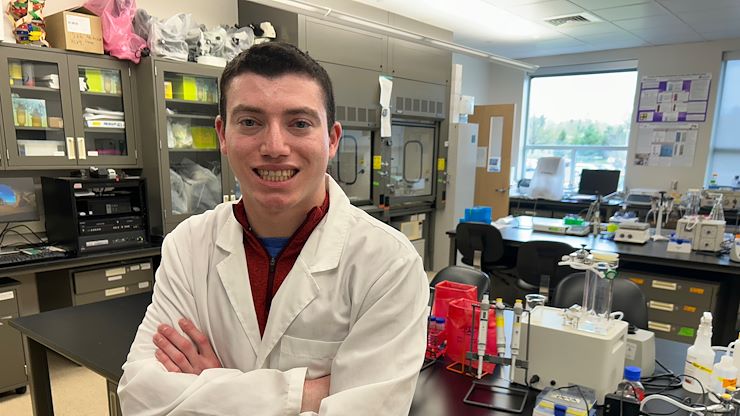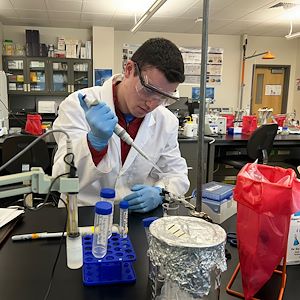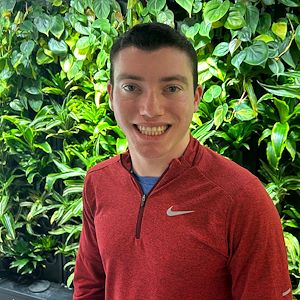
Biotechnology major Zachary Denmark will give the 2024 Montgomery County Community College Commencement student address. Photos by Eric Devlin
Zachary Denmark is about to complete a personal goal that he’s been working toward for more than seven years. Despite personal health concerns sidelining him from completing a degree, he’ll soon be able to walk across the stage at the Montgomery County Community College Commencement ceremony this year as a college graduate.
 The 25-year-old Biotechnology major from Lafayette Hill has been named MCCC’s Commencement speaker this year. Denmark’s
message to the Class of 2024 will be about persevering, even when the deck feels stacked
against you at times.
The 25-year-old Biotechnology major from Lafayette Hill has been named MCCC’s Commencement speaker this year. Denmark’s
message to the Class of 2024 will be about persevering, even when the deck feels stacked
against you at times.
“Everybody at Montco has a unique story, there are plenty of people here who have probably gone through things that far eclipse my own experiences, and I just want to connect with them and show that not only have I also been through things but tell them, hey, you were able to accomplish this despite your trials and tribulations. I want to acknowledge that.”
Overcoming obstacles
Denmark, who began studying at MCCC in 2017, never wavered from his goal of completing his degree program, it just took a bit longer than he anticipated at the start.
“I originally came to Montco because as a child I was physically very sick and unfortunately had to withdraw from high school,” he said. “I ended up getting a GED, and Montco felt like a very accommodating place in order to transition back into the educational curriculum.”
That was where Denmark’s journey first began. Reintroducing his body to the full courseload required to complete his degree, however, was too physically taxing, requiring him to take a break from school.
“I got a job to get some structure in my life and then came back and they were very accommodating,” he said. “They wanted to help me succeed.”
Diagnosed with chronic pancreatitis at just 7 years old, Denmark’s condition caused him tremendous abdominal pain. He dealt with the disease for eight years, and it culminated when he was in ninth grade. He was hospitalized for much of the school year until his family found a specialized surgeon in Minnesota to remove his pancreas. While the surgery was a success, there were still a lot of problems that followed him afterward.
“It caused my permanent departure from school for a while,” he said. He also became a diabetic because without a pancreas, the body can no longer produce insulin.
At first it was very difficult to control his diabetes. “I wasn’t in a very good head space. I had severe post-traumatic stress disorder after years of being ill,” he said. “As a consequence of that, I didn’t take care of myself. That’s where my failures at Montco stemmed from.”
Once he took control of his physical health, he was able to begin to make progress at MCCC.
Utilizing resources like the Testing Center helped Denmark take the time he needed to complete assignments and “facilitate my way back into the educational mind space.”
“It helped me get to where I am now,” he said. Denmark even eventually made the Dean’s List.
Tools to succeed
Denmark chose Biotechnology as a major because “I essentially am a Biotechnology story,” he said.
 “As a diabetic, needing insulin, having pancreatitis, I was on a feeding tube, I was
also on a PICC line, which is essentially a permanent IV, because you can’t eat or
get any nutrition whatsoever,” he said. “Biotechnology really is a part of my life
story, and it’s really given me the motivation to continue to pursue that career and
help others who have similar stories as myself. I think Montco is giving me the tools
to succeed when it comes to that.”
“As a diabetic, needing insulin, having pancreatitis, I was on a feeding tube, I was
also on a PICC line, which is essentially a permanent IV, because you can’t eat or
get any nutrition whatsoever,” he said. “Biotechnology really is a part of my life
story, and it’s really given me the motivation to continue to pursue that career and
help others who have similar stories as myself. I think Montco is giving me the tools
to succeed when it comes to that.”
During his time as an MCCC student, Denmark participated in the Merck Challenge. The event was a collaboration among four Biotechnology students, two Computer Science students and two Engineering Science students who were tasked to work together to prove whether automation through a robotic arm in Biotechnology is more accurate and efficient than human performance.
“It was a great real-world scenario,” said Denmark. “It provided a lot of interaction you might have in a lab, and it shows Montco’s great connections.”
The group proved automation is better than human effort in terms of accuracy in the lab.
“Automation is the future of where this field is heading,” he said. “It makes me feel excited. It shows me this field is constantly advancing. With automation doing certain tasks, it leaves the people of the company to do other tasks like brainstorming to solve a certain problem, continuing research, and it will increase efficiency of the process as well.”
Denmark is also the recipient of the Biotechnology Scholarship Fund. The scholarship was established by the Dentinger Family Foundation awarding $15,000 to five students, with each receiving $3,000.
Biotechnology Associate Professor Margaret Bryans had nothing but praise for Denmark’s work in the classroom.
“Zach is one of a kind, he’s a high-achieving student who always remains upbeat no matter the challenge, and he is universally liked by his peers,” she said. “I am so proud of what he has achieved in the Biotechnology program, I wish him continued success in his educational journey, and I look forward to the contributions he will make to the field in the future.”
Cutting-edge research
 After graduation, he’ll be joining the Wistar Institute in a pre-apprenticeship program. A global leader in biomedical research,
Wistar offers specialized expertise in cancer, immunology, infectious disease, and
vaccine development, according to its website. Denmark will be among students from
area community colleges joining Wistar’s biomedical technician training program.
After graduation, he’ll be joining the Wistar Institute in a pre-apprenticeship program. A global leader in biomedical research,
Wistar offers specialized expertise in cancer, immunology, infectious disease, and
vaccine development, according to its website. Denmark will be among students from
area community colleges joining Wistar’s biomedical technician training program.
“You spend two weeks learning basic laboratory techniques that you’ll be using in the lab, such as cell culture, good pipetting practices and then they send you off to a lab for five weeks,” he said. “They’ll send you to an academic lab where you can work in a research setting, maybe at a school, then another five weeks at an industrial lab where you can get a sense of the manufacturing processes that go on in real life. It really introduces you to real-world scenarios and give you an idea of what field you want to pursue.”
From there, Denmark said he’s looking to continue his education. He’s hoping to transfer to Thomas Jefferson University’s bachelor and masters of science two-year degree program for biotechnology. Then he wants to begin researching the development of non-opioid pain medications.
“I was heavily addicted to my pain medication, and it ruled my life physically, mentally and spiritually,” he said. “I was living from pain dose to pain dose, and I think finding a way to alleviate pain without that need for the dependence is where I want to dedicate my life.”
Updated 6/18/2024
